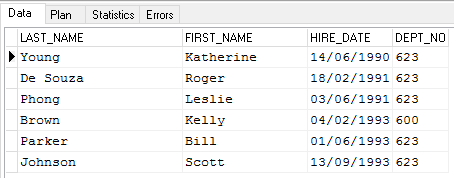InterBase Quick Start: Part IV - Controlling the Order of Evaluation
Go Up to InterBase Quick Start: Part IV - Using the WHERE Clause
When entering compound search conditions, you must be aware of the order of evaluation of the conditions. Suppose you want to retrieve employees in department 623 or department 600 who have a hire date later than January 1, 1992.
 Using a Compound Condition
Using a Compound Condition
-
SELECT last_name, first_name, hire_date, dept_no FROM Employee WHERE dept_no = 623 OR dept_no = 600 AND hire_date > '01-JAN-1992'
The image below shows the result:
The query produces unexpected results because
ANDhas higher precedence thanOR. This means that the expressions on either side ofANDare tested before those associated withOR. In example above, the search conditions are interpreted as follows:( WHERE dept_no = 623 ) OR ( WHERE dept_no = 600 AND hire_date > '01-JAN-1992' )
The restriction on the hire date applies only to the second department. Employees in department
623are listed regardless of hire date. -
Use parentheses to override natural precedence. Modify the previous query with additional parentheses, so that the query is interpreted correctly:
SELECT last_name, first_name, hire_date, dept_no FROM Employee WHERE ( dept_no = 623 OR dept_no = 600 ) AND hire_date > '01-JAN-1992'
The image below shows the expected result:
- Note: Order of precedence is not an issue just for
ANDandOR. When you use complex search conditions, always add parentheses to ensure that the conditions evaluate in order that you intend them to.
- Note: Order of precedence is not an issue just for

